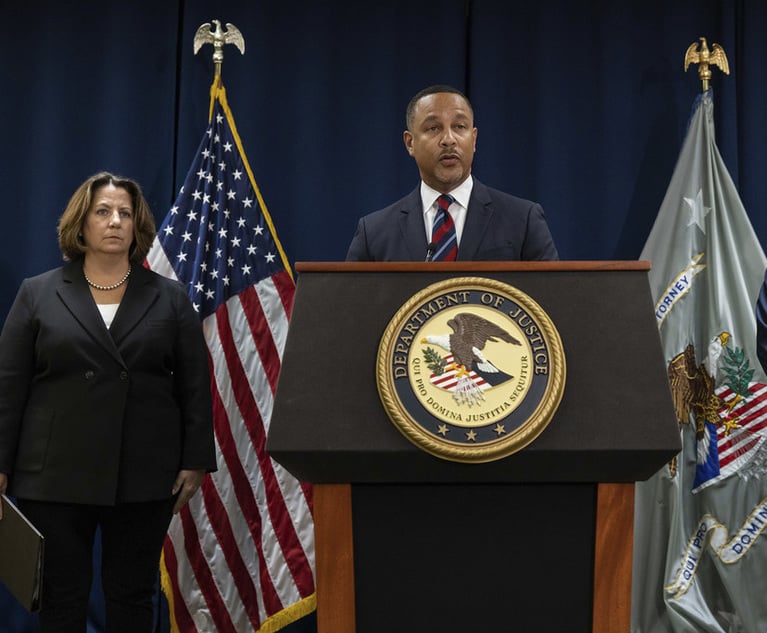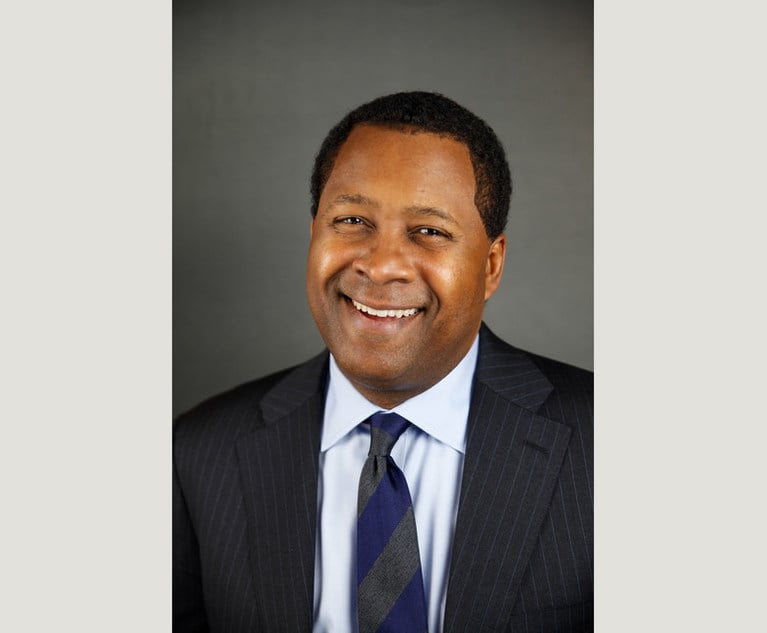Compliance Hot Spots: 'Don't Over-Promise and Under-Deliver,' And Other White-Collar Defense Advice | CFTC Leaders No Longer Face Contempt | New SCOTUS Cases Challenge FTC's Monetary Penalties | Who Got the Work
We've got a dispatch this week from ALM's Women, Influence & Power In Law conference, where top partners and in-house leaders offered perspective and guidance. Plus: law firms have a lot to say about CFIUS draft rules, and a federal appeals court has shut down a judge's push to question Senate-confirmed leaders of the CFTC. Scroll down for Who Got the Work, notable moves and headlines. Thanks for reading.
October 22, 2019 at 09:00 PM
11 minute read
Welcome to Compliance Hot Spots, and good luck to the Washington Nationals and Houston Astros tonight. Lots to unpack this week, including our report on some guidance from top white-collar defenders; a snapshot from my colleague MP McQueen of what some firms said in comment letters about draft CFIUS rules; and two new US Supreme Court petitions challenge the power of the FTC to impose monetary relief.
Tips, feedback and general thoughts on your practices are always appreciated. I'm C. Ryan Barber—reach me at [email protected] and 202-828-0315, or follow me on Twitter @cryanbarber. Thanks for reading!

Don't Poke the Bear, and Other Advice for White-Collar Defenders
The federal government is at the door, with a subpoena demanding a vast assortment of business records. And it wants it all within two weeks. What is a company and its lawyers to do?
On Friday, that was the question at the Women, Influence & Power in Law conference in Washington, where a panel of in-house lawyers and Crowell & Moring partner Rebecca Monck Ricigliano discussed how to navigate a white-collar investigation.
Here are some of the highlights from their hour-long conversation:
>>> Establish contact—and make a good first impression. Ricigliano, a former federal prosecutor in the U.S. Attorney's Office for the Southern District of New York, said an initial step in any investigation is to negotiate an extension to the subpoena's deadline for turning over records. Subpoenas, she said, often are not only broad but demanding—"with a two-week return date."
"OK, that's not going to work, right?" she said. Going into the initial conversation with the prosecutor, she said, defense lawyers should have an idea of the "low-hanging fruit"—such as organizational charts and policies—that can be provided right away.
 "Having that at the ready when you're having that conversation with the prosecutor or the regulator demonstrates two things: No.1, your commitment to being a good partner and a good cooperator throughout the course of the investigation and, No. 2, that when you ask for the additional time and the permission to make rolling productions—which is generally given as a matter of course—you are not taking advantage of them and you are not going to delay unnecessarily, because you are coming to them with good fatih documents in a good faith way to establish a real cadence to the productions that will allow them to investigate on a timely basis."
"Having that at the ready when you're having that conversation with the prosecutor or the regulator demonstrates two things: No.1, your commitment to being a good partner and a good cooperator throughout the course of the investigation and, No. 2, that when you ask for the additional time and the permission to make rolling productions—which is generally given as a matter of course—you are not taking advantage of them and you are not going to delay unnecessarily, because you are coming to them with good fatih documents in a good faith way to establish a real cadence to the productions that will allow them to investigate on a timely basis."
>>> Live up to commitments. "The key thing is don't over-promise and under-deliver. Know what you're going to be able to do, because the last thing you want to do is set a cadence and then have the first thing you have to do call the prosecutor back and say you're not going to make that deadline. That is not a good start to the relationship. And it's a relationship that, depending on the type of the investigation, could go on for years."
>>> "Is it OK to poke the bear?" After months or even years of investigating, prosecutors will sometimes go dark, leaving companies unclear on the status of the probe. The desire for information—for closure—can be overwhelming. And the status of the investigation can have ramifications for a company's obligations to make disclosures or retain records. Should a defense lawyer check in? Ricigliano described herself as a "firm believer" in this approach: "Let sleeping dogs lie."
But, she said, "there are benefits to having outside counsel who have relationships with that particular jurisdiction that's investigating or that particular agency, because there are ways to gauge. And they have that expertise and that insight to know—Is it OK to poke the bear? Are you going to wake a sleeping giant?"

What Law Firms Told Treasury About CFIUS
The 30-day comment period for draft CFIUS regulations at the U.S. Treasury Department ended last week, and among the scores of commenters were law firms and American and Canadian venture capital and investment groups. Many were asking for clarification and narrowing of the proposed new rules governing national security review of foreign investment in U.s. companies and real estate.
>> Miles & Stockbrige's Russell Randle filed a letter on behalf of the firm, not a client, asking for greater clarity on the proposed real estate rules that could cover a large swath of Washington, Maryland and Virginia in proximity to 27 military installations and several ports and airports. Randle said the proposed rules "will thus have a significant impact on the real estate markets and the jurisdictions in which we practice."
>> White & Case's Farhad Jalinous, who leads the firm's national security practice, submitted a one letter, among others, asking for clarifications on the investment rules. He was joined on the letter by White & Case partner Karalyn Mildorf, and counsels Keith Schomig and Stacia Sowerby.
>> Sidley Austin submitted comments on the real estate and voting rights provisions, among other areas. The letter was signed by partner James Mendenhall, who focuses on global arbitration, trade and advocacy.
>> Shearman & Sterling said in its letter: "We support and appreciate the efforts of the U.S. Department of the Treasury and other member agencies of The Committee on Foreign Investment in the United States ("CFIUS") to modernize CFIUS's process to better enable timely and effective reviews of certain transactions involving U.S. businesses. The comments we provide in this letter have been prepared by the Tokyo office of Shearman & Sterling LLP and reflect discussions we have had with a number of Japanese investors in U.S. businesses regarding the proposed rule."
The National Venture Capital Association based in Washington,D.C., Canadian Pension Plan Investment Board also submitted concerns about exceptions for foreign investors, and several Chinese trade groups and agencies including the China Chamber of International Commerce submitted letters.
 Giovanna Cinelli, (at left) partner and leader of the international trade and national security practice at Morgan, Lewis & Bockius in Washington, said: "I have been on federal advisory committees since the 1990's and there is a consistent approach that the immediate reaction is to tailor the application of the regulation, so I didn't see anything of surprise here and I didn't see anything inconsistent in [what]the parties have said publicly."
Giovanna Cinelli, (at left) partner and leader of the international trade and national security practice at Morgan, Lewis & Bockius in Washington, said: "I have been on federal advisory committees since the 1990's and there is a consistent approach that the immediate reaction is to tailor the application of the regulation, so I didn't see anything of surprise here and I didn't see anything inconsistent in [what]the parties have said publicly."
Cinelli said that stakeholders have been meeting with the Treasury Department to discuss rulemaking throughout the process. —MP McQueen

Who Got the Work
>> Two new U.S. Supreme Court petitions filed in recent days challenge the power of the Federal Trade Commission to impose monetary penalties—such as restitution—through the agency's injunction statute. Jeffrey Lamken (above) of MoloLamken LLP is counsel to AMG Capital, and Peter Homer of the Miami firm Homer Bonner Jacobs is counsel to Publishers Business Services.
"The commission sought and obtained an unprecedented award of $1.27 billion in 'restitution'—in fact, a cash payment to the government that it may keep if distribution is 'impracticable'—without satisfying the more rigorous standards that Congress imposed in § 19 of the FTC Act, which expressly authorizes monetary remedies. The commission did so, moreover, without regard to any statute of limitations," Lamken wrote.
Homer said in his petition that "these monetary awards have proved to be exceedingly punitive, almost unlimited in amount, often imposed jointly and severally, and untethered to procedures, notions of proximate causation, and limitations Congress required elsewhere in the FTC Act."
>> Hogan Lovells said Saudia Arabia had agreed to continue working with the firm on various matters, according to new filings under the Foreign Agents Registration Act. The firm inked a $125,000 monthly contract last year, and the legal services will run through December 2019. Hogan Lovells said it "provides legal counsel to the foreign principal in connection with general foreign policy and related matters." The firm also said it "renders advice on legislative, regulatory and public policy activities of interest."
>> Covington & Burling's Stephen Rademaker, senior of counsel, will lobby for the electronics manufacturer Flextronics. His task, according to a lobbying disclosure. The advocacy will focus on familiarizing "government officials with the company's US operations and the potential impact of trade restrictions on those operations." Before becoming senior of counsel at Covington, Rademaker served under the George W. Bush administration as an assistant secretary of state.

Compliance Reading Corner
US Appeals Court Stops Judge's 'Inquest' of CFTC Leaders.The U.S. Court of Appeals for the Seventh Circuit overturned an order compelling three Senate confirmed leaders—Chairman Heath Tarbert, a Republican, and Democratic Commissioners Dan Berkovitz and Rostin Behnam—to appear in court and testify about remarks they made about the settlement, despite a gag provision that limited what the commission could say publicly. The court said the trial judge can still assess whether the CFTC itself should be held in contempt. [NLJ]
Consumer-Watchdog Settlements Reach Four-Year High. "Consumers harmed by financial firms got back $777 million through actions by the Consumer Financial Protection Bureau during the last fiscal year, the largest amount in four years. The amount included settlements of a few significant long-pending investigations, which were among the 22 enforcement cases the CFPB announced during the fiscal year ended Sept. 30, the agency said." [WSJ]
How to Navigate the Changing Tide of Federal Regulation. Three tips from Wiley Rein partner Brian Walsh: 1. Be proactive. Federal regulations don't just change overnight. 2. Don't assume an administration change will result in regulatory change. 3) Stay Informed. [NLJ]
Inside Facebook's Botched Attempt to Start a New Cryptocurrency. "Facebook executives seemed unsure how to navigate the bureaucracy of finance, once showing up to a meeting at the Treasury Department and another at the Federal Reserve with brief overviews of libra that left unanswered questions." [WSJ]
DOJ's Use of Data Analytics Becomes the 'Norm.' The indictment in September of three current or former JPMorgan Chase traders "demonstrated the results of DOJ's and the FBI's increasing use of data analytics to develop prosecutorial leads," writes Matthew Levine, Guidepost Solutions' president of financial and regulatory compliance services. The head of the Justice Department's criminal division, Assistant Attorney General Brian Benczkowski, encouraged banks, trading firms and other financial institutions to begin scrutinizing their own trading data, so that these institutions can detect possible misconduct. [NYU's Compliance & Enforcement blog]
Private Equity Lobby Group Mounts Campaign to Counter Critics. "Private equity's largest lobbying group in Washington aims to counter claims of the industry's negative effects through an advertising campaign and a new economic impact report. The American Investment Council, a trade group whose members include nearly all the largest private-equity firms in the U.S., on Monday published the report detailing the industry's job creation, tax payments and contributions to economic growth." [WSJ]

Notable Moves & More
>> Boies Schiller Flexner is bringing on Tracey Dovaston, Barclays' head of litigation, investigations and regulatory enforcement for Europe and the Middle East (EME), as a partner in London. Dovaston will start in January 2020 as part of the law firm's push to build its regulatory, investigations and litigation practice.
>> Greenberg Traurig has hired David Miller, a former federal prosecutor in the Southern District of New York who spent the past five years at Morgan, Lewis & Bockius. Miller reportedly was once under consideration for U.S. attorney in Manhattan in the Trump administration.
>> Wilson Sonsini Goodrich & Rosati said it's brought on Kenneth O'Rourke to bolster its antitrust litigation practice. O'Rourke is formerly a longtime O'Melveny & Myers partner.
>> Carlton Fields has hired Simon Gaugush as of-counsel in the firm's Tampa office. Gaugush formerly was a federal prosecutor for more than 10 years.
This content has been archived. It is available through our partners, LexisNexis® and Bloomberg Law.
To view this content, please continue to their sites.
Not a Lexis Subscriber?
Subscribe Now
Not a Bloomberg Law Subscriber?
Subscribe Now
NOT FOR REPRINT
© 2025 ALM Global, LLC, All Rights Reserved. Request academic re-use from www.copyright.com. All other uses, submit a request to [email protected]. For more information visit Asset & Logo Licensing.
You Might Like
View All
Compliance Hot Spots: GOP Eyes ESG as an Antitrust Issue + Another DOJ Crypto Seizure + Sidley Partner Jumps to Main Justice
9 minute read
Compliance Hot Spots: Lessons from Lafarge + Fraud Section Chief Talks Compliance + Cravath Lands FTC Commissioner
11 minute readTrending Stories
- 1Inherent Diminished Value Damages Unavailable to 3rd-Party Claimants, Court Says
- 2Pa. Defense Firm Sued by Client Over Ex-Eagles Player's $43.5M Med Mal Win
- 3Losses Mount at Morris Manning, but Departing Ex-Chair Stays Bullish About His Old Firm's Future
- 4Zoom Faces Intellectual Property Suit Over AI-Based Augmented Video Conferencing
- 5Judge Grants TRO Blocking Federal Funding Freeze
Who Got The Work
J. Brugh Lower of Gibbons has entered an appearance for industrial equipment supplier Devco Corporation in a pending trademark infringement lawsuit. The suit, accusing the defendant of selling knock-off Graco products, was filed Dec. 18 in New Jersey District Court by Rivkin Radler on behalf of Graco Inc. and Graco Minnesota. The case, assigned to U.S. District Judge Zahid N. Quraishi, is 3:24-cv-11294, Graco Inc. et al v. Devco Corporation.
Who Got The Work
Rebecca Maller-Stein and Kent A. Yalowitz of Arnold & Porter Kaye Scholer have entered their appearances for Hanaco Venture Capital and its executives, Lior Prosor and David Frankel, in a pending securities lawsuit. The action, filed on Dec. 24 in New York Southern District Court by Zell, Aron & Co. on behalf of Goldeneye Advisors, accuses the defendants of negligently and fraudulently managing the plaintiff's $1 million investment. The case, assigned to U.S. District Judge Vernon S. Broderick, is 1:24-cv-09918, Goldeneye Advisors, LLC v. Hanaco Venture Capital, Ltd. et al.
Who Got The Work
Attorneys from A&O Shearman has stepped in as defense counsel for Toronto-Dominion Bank and other defendants in a pending securities class action. The suit, filed Dec. 11 in New York Southern District Court by Bleichmar Fonti & Auld, accuses the defendants of concealing the bank's 'pervasive' deficiencies in regards to its compliance with the Bank Secrecy Act and the quality of its anti-money laundering controls. The case, assigned to U.S. District Judge Arun Subramanian, is 1:24-cv-09445, Gonzalez v. The Toronto-Dominion Bank et al.
Who Got The Work
Crown Castle International, a Pennsylvania company providing shared communications infrastructure, has turned to Luke D. Wolf of Gordon Rees Scully Mansukhani to fend off a pending breach-of-contract lawsuit. The court action, filed Nov. 25 in Michigan Eastern District Court by Hooper Hathaway PC on behalf of The Town Residences LLC, accuses Crown Castle of failing to transfer approximately $30,000 in utility payments from T-Mobile in breach of a roof-top lease and assignment agreement. The case, assigned to U.S. District Judge Susan K. Declercq, is 2:24-cv-13131, The Town Residences LLC v. T-Mobile US, Inc. et al.
Who Got The Work
Wilfred P. Coronato and Daniel M. Schwartz of McCarter & English have stepped in as defense counsel to Electrolux Home Products Inc. in a pending product liability lawsuit. The court action, filed Nov. 26 in New York Eastern District Court by Poulos Lopiccolo PC and Nagel Rice LLP on behalf of David Stern, alleges that the defendant's refrigerators’ drawers and shelving repeatedly break and fall apart within months after purchase. The case, assigned to U.S. District Judge Joan M. Azrack, is 2:24-cv-08204, Stern v. Electrolux Home Products, Inc.
Featured Firms
Law Offices of Gary Martin Hays & Associates, P.C.
(470) 294-1674
Law Offices of Mark E. Salomone
(857) 444-6468
Smith & Hassler
(713) 739-1250










